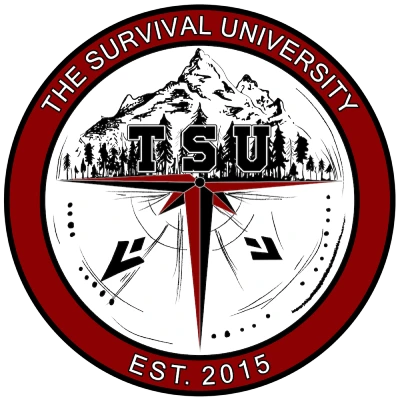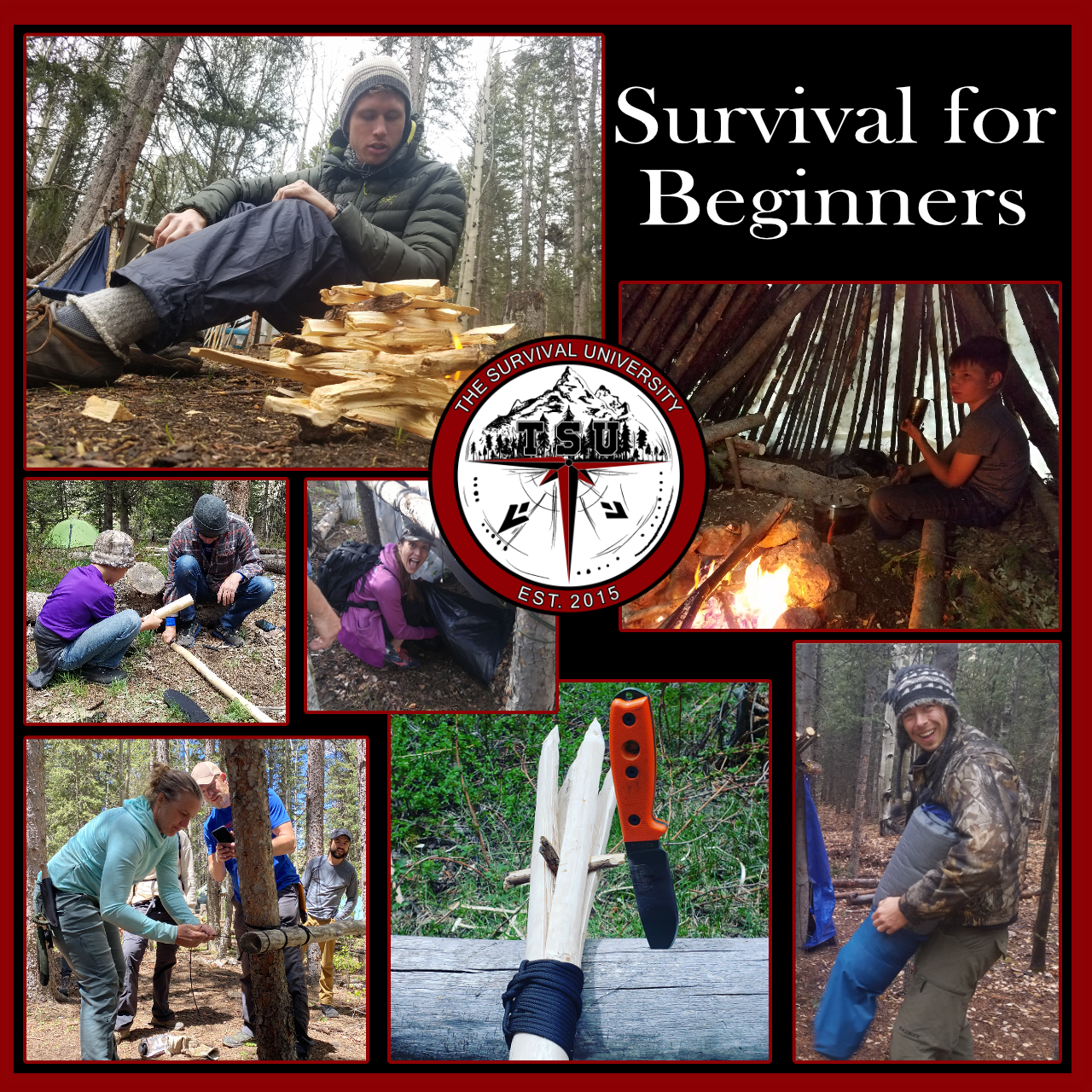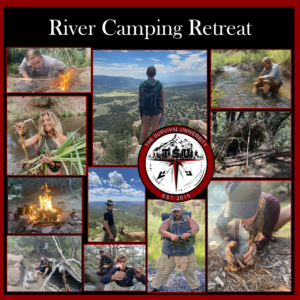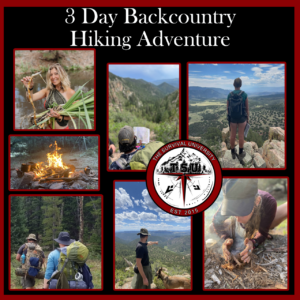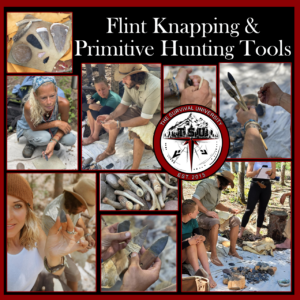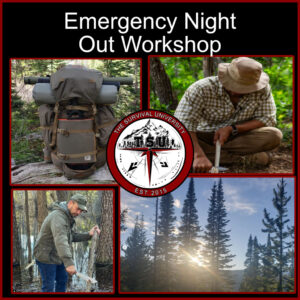Cart
2 DAY SURVIVAL FOR BEGINNERS
$295.00
Learn the mindset and skills to handle real-world emergencies on short outdoor trips. Over two days you’ll practice firecraft, shelter building, water purification, signaling, and trip planning in the Colorado mountains. This hands-on course is perfect for beginners, families, or anyone looking to build confidence outdoors.
Description
2-Day Survival for Beginners
Location: Mountain Camp, Colorado – 9,500 ft elevation, pine and aspen forest, private land
Most outdoor emergencies don’t happen deep in the wilderness, they happen on day hikes, weekend camping trips, or when a simple plan goes wrong. This two-day beginner’s course is designed for everyday people who want the confidence to handle a 72-hour emergency.
You’ll learn the mindset, awareness, and fundamental skills that keep people alive in real situations. This class is not about memorizing theory, it’s about practicing the core survival skills every human should know, in a safe but challenging outdoor environment.
What You’ll Learn
- Mindset & Awareness: The psychology of survival, Rule of Threes, situational awareness, and decision-making under stress.
- Preparedness & Lost-Proofing: How to plan a safe outing, what to pack, how to avoid getting lost, and how to recover if you do.
- Gear & Tools: Safe and effective use of knives and basic survival tools; selecting the right gear for short trips.
- Firecraft: Multiple modern fire-starting methods; how to build and maintain reliable fires for warmth, signaling, and comfort.
- Shelter: How to select a site and construct an emergency shelter that protects from the elements.
- Water: Where to find water, how to make it safe with modern methods, and how to ration responsibly.
- Signaling: Methods to alert rescuers using sound, sight, and movement.
- Animal Safety: Understanding Colorado wildlife, avoidance strategies, and what to do in an encounter.
- Knots & Cordage: Basic knots for shelter, tarps, and camp craft.
Outcomes
By the end of this course, you will:
- Know how to plan and prepare for safe trips outdoors.
- Understand how to avoid panic and make good decisions when things go wrong.
- Be able to build a fire, purify water, erect an emergency shelter, and signal for help.
- Have practiced each skill enough to do it confidently in real conditions.
This class is approachable for families, beginners, or anyone who wants to reconnect with the fundamentals of being outdoors. It’s the perfect first step before advancing to our 5-Day Survival Basics course.
General Daily Flow
Day 1 – Foundations & First Skills
Orientation, safety, and survival mindset. Lost-proofing and trip planning. Knife safety. Modern firecraft (lighter, matches, ferro rod) with first successful fires. Emergency shelter site selection and quick tarp/debris builds. Evening campfire discussion on signaling and real-world scenarios.
Day 2 – Water, Signaling & Mini-Scenario
Modern water finding and purification (boiling, filters, tablets). Signaling methods (whistle, mirror, improvised). Wildlife awareness and avoidance. A short team scenario combining fire, shelter, and water under light time pressure. Wrap-up, and next-steps guidance.
Take the First Step
Reserve your spot today and build the confidence to handle the unexpected.
Product Details
-
Course Name: 2-Day Survival for Beginners
-
Location: Mountain Camp, Colorado – 9,500 ft elevation, pine and aspen forest, private land
-
Schedule: 9:00 AM – 5:00 PM each day
-
Duration: 2 Days
-
Approach: Hands-on training, practical skills, family-friendly, beginner-friendly
- Instructor Type: TSU Resident Instructor
-
Driving Directions: [Click here for directions]
Address: 71 Monarch Dr, Cripple Creek, CO 80813
(Important: Our camp is remote and GPS is often unreliable. Please read these directions carefully and have them saved or printed before you leave. Cell service is limited once you head into the mountains.)
Class Details
Accommodations
Students may camp on-site or stay in nearby towns. Cripple Creek is 15 minutes away, Woodland Park is 30 minutes. Students arrange their own lodging if not camping. At camp, a central fire ring and a few designated sites are available, with dispersed camping as the primary option. Cars can be parked within 100 feet of camp.
-
Sleeping Arrangements: Students are responsible for their own overnight shelter (tent, camper, hammock, or tarp setup).
-
Facilities: Porta potty restroom and potable water provided.
Food and Water
Potable water is available at camp. Students bring their own food. Quick meals like freeze-dried pouches or MREs are recommended, though you may bring any food suitable for campfire cooking or personal stoves. Local groceries and restaurants are nearby.
Gear List
Core Survival Tools
-
Fixed-blade knife (full tang, 4–5” blade, plain edge)
-
Ferrocerium rod and striker
-
Folding hand saw
-
100 feet of 550 paracord
-
Small backpack or daypack
Shelter & Sleep
-
Tent, tarp, or hammock
-
Sleeping bag and pad
-
Rain gear or poncho
Cooking & Water
-
Metal pot or cup
-
Eating utensils and small bowl/plate
-
Single-walled metal water bottle or canteen
-
Meals and snacks
Clothing
-
Non-cotton layers (wicking base, insulating mid, waterproof outer shell)
-
Outdoor boots and wool socks
-
Warm gloves and hat
-
Sunglasses, sunscreen, insect repellent
-
Shemagh, bandana, or scarf
Lighting & Miscellaneous
-
Headlamp with spare batteries
-
Personal first aid kit
-
Notebook and pencil (optional)
Optional Comfort Items
-
Camp chair or stool
-
Pillow or cushion
-
Extra snacks or comfort food
-
Camera or phone for photos
You may also like…
-
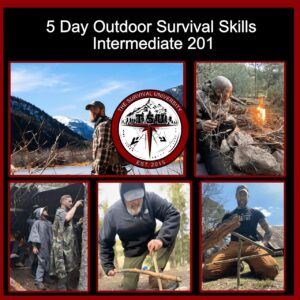
5 DAY OUTDOOR SURVIVAL SKILLS INTERMEDIATE 201
$595.00-
Select options This product has multiple variants. The options may be chosen on the product page -
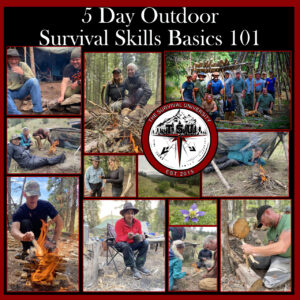
5 DAY OUTDOOR SURVIVAL BASICS 101
$595.00-
Select options This product has multiple variants. The options may be chosen on the product page
